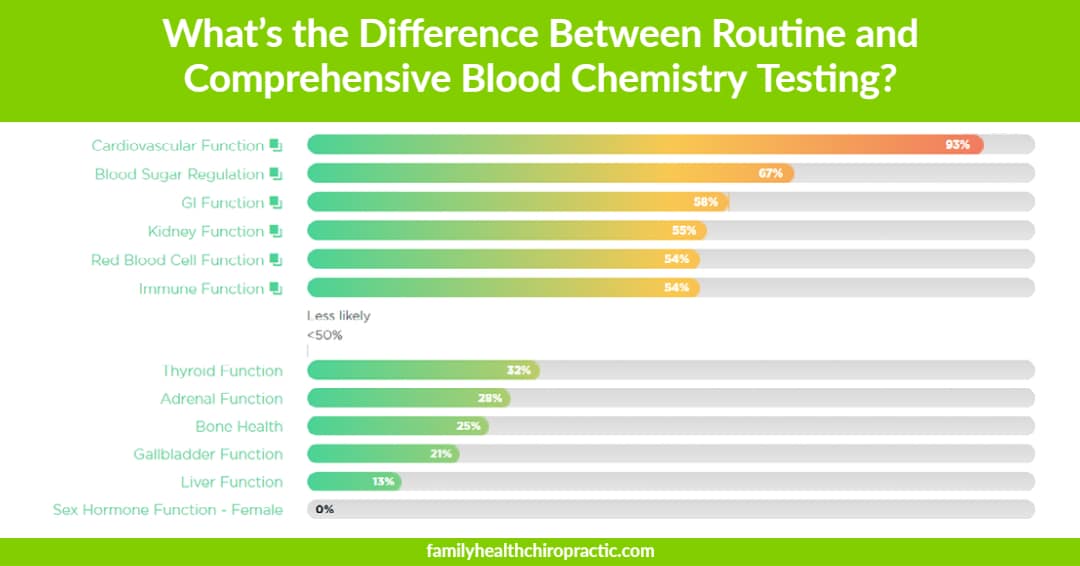As a Functional Medicine Doctor, I absolutely love nerding out with fellow doctors interested in learning more about functional medicine approaches to various conditions.
And one of the most important lessons, whether you’re a patient or a doctor, is that you follow a therapeutic ladder and not get sidetracked with bright, shiny objects.
There’s an old parable about four blindfolded men and an elephant that is a useful way to think about Functional Health and medicine.
Four blindfolded men are brought into a room with an elephant and asked to guess what’s in the room with them.
Each man touches one part of the elephant and shares what he has found. The first holds the tail and says, “it must be a rope.”
The second feels the leg and declares, “no, it must be a tree.”
The third grabs the trunk and says, “this is a snake.”
And the fourth tugs on the ear and says, “you’re all wrong because I’ve got a leather jacket over here.”
It’s obvious to us that each man cannot see the bigger picture. He can’t grasp how each of the parts fits together to be an elephant. Imagine if they could take off their blindfolds or spend some time exploring and asking questions.
For understanding how our body is functioning, looking at the complete picture is necessary and it begins with a thorough understanding of blood, guts and hormones and the therapeutic ladder.
Starting with Your Story
History taking is part of every clinician’s best practice, but its importance is all too often overlooked.
I often tell patients and doctors, “You are your own BEST doctor.”
Meaning that no one understands your body, how you feel and what’s going on internally, then you. It’s our goal as clinicians to listen to your story.
What you’re experiencing and combined with a clinician’s clinical experience, helps to come to a logical conclusion of what is happening and what the next steps are in helping you to fix it.
Part of the initial health intake and history analysis is to develop a health timeline, intended to help organize your life experience that helps to better understand the causes of illness.
A proper intake and history intake will lead to the identification of antecedents, triggers and mediators of illness that predispose, provoke, and contribute to pathological changes and dysfunctional processes in your physiology.
In this way, both practitioners and patients can identify cause-effect relationships that might otherwise go unnoticed.
By covering the period from preconception to the present, your health intake and history reflect the connection between the whole lifespan and one’s current health.
This is exactly why I ask patients if they’ve had labs and if so, can they share them with me?
Where most doctors dismiss old labs, I find great value in studying your biochemical history.
I like to compare this to forecasting the weather.
If I asked you to forecast the weather next month and only gave you the current weather pattern of the day, your forecast will not be very accurate.
However, if I gave you twenty years’ worth of data, well, your forecast is going to have much greater certainty.
In this manner, your personal health history, (including blood chemistry) and all the factors that have led up to your current expression of health (or lack thereof), are crucial to how we move forward.

Blood: Undergoing Functional Blood Chemistry Analysis
Following an appropriate health history and intake, the next step in understanding your health status is undergoing a functional blood chemistry analysis.
What the heck is that?
First, good old blood chemistry testing is tried and true and stands upon a foundation of solid scientific merit and rigor.
What I’m saying here is blood chemistry or clinical laboratory science is far superior in terms of accuracy, sensitivity and specificity than any other test being promoted by integrative or functional medicine clinics.
In the world of functional medicine, you’ll hear all about the latest and greatest advanced fancy-shhmansy tests, including:
- Food Sensitivity Testing
- Organic Acid Testing
- Genetic Testing
- Vitamin and Mineral Testing
- Heavy Metal Testing
- Microbiome and Gut Testing
- Hormone (Sex and Stress) Testing
And while these tests provide additional information and can help, they are not the first place to start.
For example, food sensitivity testing has been all the rage and while it’s important to identify sensitivities, it’s not the most accurate test to begin with.
All food sensitivities are based on immune function and how your body reacts to foods.
This means that there are factors that can influence food sensitivity results.
For example, if your immune system is not functioning well, or if you have digestive inflammation or low-grade infections, of course you’ll have food sensitivities.
But are these true food sensitivities, or simply a symptom of some other problem?
If you find that your white blood cells are in a good place (between 5.5 and 8.0), there are no signs of digestive infections or inflammation, then a food sensitivity test becomes much more accurate and useful.
Therefore I would not advise starting with food sensitivity testing.
Rather, working from the foundations of health analysis (Health history and Intake and Blood Chemistry) and moving up the ladder of diagnostics if necessary.
Let’s get back to what Functional Blood Chemistry is all about.
Most conventional medical practices will order a routine blood chemistry panel as part of an annual exam or when you present with symptoms.
It’s important to acknowledge that routine blood chemistry testing differs from comprehensive blood chemistry testing.
I cannot tell you how many times people undergo routine testing and will say things like, “My doctor ordered blood work, and it’s all normal.”
First, you probably had routine blood chemistry testing, which in the world of blood chemistry analysis is only looking at one part of the elephant.
Second, your doctor likely reviewed your labs using the standard lab reference ranges. If you’re normal, it simply means you will not drop dead today or tomorrow. It certainly doesn’t mean you’re healthy.
Routine Blood Chemistry Panels
- CBC or complete blood cell count (white blood cells, red blood cells, etc.)
- Metabolic Panel (includes ions, salts, minerals, transport proteins and a few enzymes, blood sugar)
- Standard Lipid Panel (cholesterol markers)
- TSH
- Maybe.. Vitamin D, A1C hemoglobin, iron and inflammation markers
All the above is usually part of a routine blood chemistry panel and can provide excellent information if you understand how to analyze and interpret the data.
Functional Blood Chemistry is all about how you analyze and interpret the data.
Simply looking at your blood at face value is a major under appreciation of the applicability of this clinical laboratory sciences.
Even better, when you undergo comprehensive blood chemistry testing, combined with a Functional Blood Chemistry analysis, you’ll have a much better idea of what systems of your body need to be supported, to improve your personal health.
Comprehensive Blood Chemistry Panels
- CBC
- Comprehensive Metabolic Panel
- Standard Lipid Panel
- Lipoprotein Fractionation (LDL-P, ApoA, ApoB, Ox-LDL, etc)
- Complete Thyroid Panel (TSH, Total and Free T4, Total and Free T3, Reverse T3, Thyroid Antibodies, etc.)
- Vitamin Testing (Vitamin A, C, D, B1, B6, B12, Folate, etc.)
- Mineral Testing (Magnesium, Phosphorous, Zinc, Copper)
- Complete Iron Panel (Iron, Ferritin, TIBC, etc)
- Inflammation Markers (hs-crp, ESR, uric acid, homocysteine, etc)
- Immune Reactivity Markers (immunoglobulins, complement cells, etc.)
- Glucose Regulation Markers (a1c hemoglobin, insulin, c-peptide, LDH)
With the right type of testing, and the right type of analysis, a solid functional blood chemistry analysis allows us to assess major systems of the body, including:
- Blood Sugar Regulation
- Cardiovascular Function
- Immune Function
- Digestive Function
- Liver & Gallbladder (Detoxification) Function
- Adrenal & Stress Function
- Thyroid & Metabolic Function
- Red Blood Cell (nutrient and oxygen capacity) Function
- Kidney Function
- Inflammation, Oxidative Stress and Toxicity
These are all major physiological systems of our body. Undergoing an appropriate blood chemistry analysis will offer key insights into what systems of your body are imbalanced and lead to a priority of health recommendations and focus.
Blood brings oxygen and nutrients to all the parts of the body so they can keep things working.
Blood carries waste materials to the lungs, kidneys, and digestive system so they can be removed efficiently. Blood fights infections and carries hormones around the body.
Blood, and a functional blood chemistry analysis, is the first objective diagnostic step to optimizing your health.
Now, if you’ve worked on balancing blood chemistry and you are still experiencing symptoms, the next most important assessment is your Guts (comprehensive stool testing).

Guts: The Value of Comprehensive Stool Testing
As mentioned previously, our blood is a major part of our health and illness.
Skipping this form of health analysis and assessment leaves a lot on the table of what is negatively influencing and driving health.
If you’ve had appropriate blood chemistry testing and worked consistently on correcting any imbalances, but still experiencing symptoms, then checking in on your digestive system is the next step on a therapeutic ladder.
We all know that food, nutrients and lifestyle are major pillars of health. Eating good food and identifying an appropriate diet is paramount. But that’s only step number one.
Just because you eat good food doesn’t mean you’re fully digesting, absorbing, and assimilating that food. This is where stool and microbiome testing become valuable.
If you’ve been eating healthy, exercising and improving other lifestyle factors and not getting the results you want, it could be because your shit is literally broken.
Once again, it’s important to understand that comprehensive stool testing is not the same as a standard stool culture or is much different than a colonoscopy or endoscopy.
A comprehensive stool test is a test that provides more detailed information about gut health, including:
- Beneficial bacteria and overall bacterial balance
- Gut pathogens, including potentially pathogenic bacteria, yeasts, and parasites
- Overall gut health, including things like digestion, absorption, immune function, inflammation, and short-chain fatty acids
- Potential signs of inflammatory bowel disease, colorectal cancer, or other more serious gut conditions
Stool and microbiome testing can help identify why someone may not be benefiting from the diet and lifestyle changes that they’ve committed to.
But not all stool tests are accurate, and some can be flat-out misleading.
Over the last 15 years, I have tested, retested and experimented with literally every single lab that offers gut and microbiome testing. I can tell you with 100% certainty that most testing companies out there cannot be trusted.
You might particularly benefit from more extensive stool and microbiome testing if you have any of the following symptoms or conditions:
- Digestive issues
- Acid reflux (GERD)
- Gas or bloating
- Abdominal pain
- Constipation
- Diarrhea
- Irritable bowel syndrome
- Inflammatory bowel disease
- Diverticulitis
- Rapid weight gain or weight loss
In my clinical experience, there are many conditions that are not thought of as digestive issues, but certainly play a role.
This includes:
- Elevated Cholesterol
- Food intolerances
- Rashes or hives
- Acne
- Mood disturbances, depression, or anxiety
- Brain fog and Fatigue
- Joint pain & inflammation
- Chronic sinus issues or allergies
Food is one of the best forms of medicine that anyone could work on improving. But if you have digestion issues that are preventing your body from absorbing it, you’ll never benefit.
Food provides the nutrients that act as a sort of currency that our body needs to conduct business.
At its most basic level, vitamins, minerals, amino-acids and water are needed to drive the billions of biochemical transactions that are occurring every second of your life.
If you’re unable to break food down (proteins, carbohydrates and fats) into the smaller components, your cells will suffer and become dysfunctional.
Dysfunctional cells lead to dysfunctional tissues.
Dysfunctional tissues lead to dysfunctional organs and organ systems, eventually resulting in disease and pathology.
For this reason, the digestive system is intimately connected to all other major physiological systems including: the brain, skin, immune, cardiovascular, endocrine or hormone and musculoskeletal systems.
It is why I consider assessing the digestive system, the next step in building up health, after working on optimizing blood chemistry.
However, if your blood chemistry is balanced and your digestive system proves to be healthy as well, the next important step in health optimization is hormones.

Hormones: Super Complicated and Clinically Oversimplified
Our hormones play a major role in communicating signs of imbalance throughout the body. But hormones do not simply go out of balance for no reason.
In a healthy, functioning individual, hormones will be regulated and operating as they should. So when they become imbalanced, it’s not THE PROBLEM, but a sign of some underlying dysfunction that needs to be addressed.
Why start with Blood and Gut testing?
Because there are so many moving parts to what ultimately become the production, utilization and metabolism of hormones and if you try to simply top off hormones with hormone replacement therapy, you’re likely missing the bigger picture.
For example, thyroid hormone regulation is influenced by the state of the body, from fed to starved and adequate intake and availability of the nutrients.
Some of the most important nutrients influencing thyroid hormones include selenium, iodine, iron, magnesium, zinc, vitamin A, E, D and C and they all contribute to healthy levels and functioning of thyroid hormones.
The intake of proteins, carbohydrates and fats, and the digestion and absorption of these foods, directly influences the production of sex hormones such as estrogen, progesterone and testosterone.
Cholesterol is a vital precursor to both sex and stress hormones and if your cholesterol is low, or your body is not processing fats appropriately (such as having gallbladder dysfunction), you’ll develop hormone imbalances.
But this imbalance is simply a symptom of another dysfunction.
Therefore starting with a solid, comprehensive blood chemistry panel is so vital to understanding the bigger picture (the entire elephant).
And after optimizing blood, the next step is your guts.
Most people don’t know this, but gut microbiota is itself an endocrine or hormone producing organ.
The endocrine system is primarily composed of glands that each produce a single or at most a few compounds that influence our body. However, the collection of organisms in our digestive tract produces many hormonal chemicals that are released into the bloodstream and act at distal sites.
So once again, before jumping to testing and treating hormones, get your blood chemistry and poop pipes in order first.
If you do get hormones measured, it's important to appreciate the fact that hormones fluctuate quite a bit throughout the day.
This is why blood chemistry testing for hormones is not very accurate.
For example, a woman can get her blood drawn at 8 AM in the morning and be told that she has “low estradiol”. But just two hours later, if she had another blood draw, her estradiol levels could skyrocket and she'd be told that she has “high estradiol”.
This is because hormone production ebbs and flows constantly and when you have your blood drawn, you're simply observing what's happening at that moment. It's not a true indication of what is happening over time.
I recommend a combination of blood chemistry testing, saliva and urinary testing. Urine and saliva contain total levels of hormones produced throughout the day. This would provide a much better picture of what is actually happening.
It's shocking to think of how many men and women are being treated for “hormone imbalance” when they've only had one or two blood chemistry measurements.
All that said, optimizing hormones is important and it certainly should be looked into, but only after optimizing all other factors that contribute: Blood and Guts!

Functional Medicine at Family Health Chiropractic
For many of us struggling with pain and fatigue, it’s tough to know how or why we lost our spark. It’s equally frustrating to get it back on your own.
Unlike disease-centered medicine that simply treats symptoms, Family Health Chiropractic and Integrative Medicine's goal is to look deeper, drawing from the best diagnostic tools to assess, identify and correct critical imbalances at the root of disease and illness.
If you are tired of not feeling like yourself or you sense something is wrong, and you’ve been told your labs look normal or that it is all in your head? We are here to help.
Our integrative approach to wellness through functional medicine offers a systematic approach to root cause resolutions.
We recognize that no two humans are ever the same (even twins) and by combining natural medicine with integrative medicine; we can uniquely personalize the functional medicine approach for a variety of ages and health conditions.
If you’re interested in our functional medicine services, contact our office to schedule a complimentary consultation or first visit.



